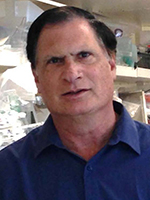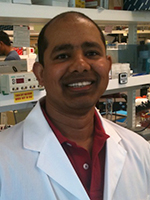-

Stephen A. Spector, MD
Dr. Spector, a world leader in HIV research for more than 25 years, is Distinguished Professor of Pediatrics, the Chief of the Division of Pediatric Infectious Diseases and Director of the UCSD Mother-Child-Adolescent HIV Program. His laboratory research has used molecular and Immunologic approaches to study host-virus interactions of human cytomegalovirus (CMV) and human immunodeficiency virus type-1 (HIV-1) with a particular emphasis developing novel approaches for the detection, treatment, genetic risk factors and eradication of persistent viruses of humans including the central nervous system. -

Rachel Bruckman
Master’s Student
Rachel Bruckman is a Master’s Student in Biology at UCSD. Her research focuses on the induction of autophagy to inhibit HIV-1 in macrophages and CD4+ T lymphocytes. She is specifically examining the potential of PI3K/MTORC1 inhibition to block HIV-1 replication. -

Grant Campbell, Ph.D.
Assistant Research Scientist
Dr. Campbell’s research studies the mechanisms that control autophagy in response to HIV-1 and M. tuberculosis infection by developing our understanding of how the endo/lysosomal system of macrophages is converted into providing a niche environment for controlled replication by M. tuberculosis and HIV-1. With a view to controlling infection, he is in the process of identifying pharmacological agents that induce autophagic flux and inhibit both HIV-1 and M. tuberculosis in macrophages. Through this work he has shown that the active metabolite of vitamin D induces autophagy and inhibits both HIV-1 and M. tuberculosis infection of macrophages. -

Yen-Lin (Lincy) Chu, Ph.D.
Postdoctoral Researcher
Dr. Chu is interested in exploring novel approaches to treat and eradicate HIV-1 that can be used in the clinic. The focus of her current research is to establish a model of HIV infection that mimics the current knowledge of HIV-1 reservoirs in resting T cells and to develop approaches designed to eradicate HIV-1 from these cells. -

Ankita Garg Jaiswal, Ph.D.
Postdoctoral Researcher
Dr. Garg studies the myeloid derived suppressor cells (MDSCs) mediated immune suppression in HIV-1 infection. Her research interest focuses on investigating the crosstalk among immune cells leading to immune dysfunction in HIV-1 and HIV-1 co-infections (MTB and CMV). She is now spearheading a project on mechanisms of MDSC mediated loss of immunity in HIV and HIV-1 co-infections with a goal to translate the findings towards new therapeutic and diagnostic modalities. -

Pratima Rawat. Ph.D.
Assistant Project Scientist
Dr. Pratima Rawat’s area of research interest involves regulation of HIV-1 pathogenesis by host cellular factors. Current research focuses on the role of HIV-1 induced modulation of autophagy in regulation of HIV-1 infection and its implication in development of the latent reservoir in infected brains. This study also includes the role of various host cellular factors like IRGM, TFEB and viral factors like Nef, Tat etc in this process. Her current studies are targeted towards eradication of HIV-1 from infected macrophages and microglia through induction of autophagy and killing of HI-1 or preferential killing of HIV-1 infected cells. -

Kumud K. Singh, Ph.D.
Associate Adjunct Professor
Dr. Singh’s is involved in understanding the unique role of innate immunity in HIV-1 neuropathogenesis and neurodegenerative diseases. His lab focuses on how complement activation in HIV-1 infected brain leads to immune complex deposition, neuroinflammatory cytokine response and HIV-1 associated neurocognitive disorders. Singh lab hypothesizes that complement activation is a common mechanism of neuroinflammation and CNS impairment due to an infection (HIV), autoimmunity (multiple sclerosis) and aging related consequences (Alzheimer’s disease). -

Carol Christensen
Staff Research Associate -

Terrence Robinson
Staff Research Associate -

Rodney Trout
Staff Research Associate -

John Wang Byungo
Undergraduate Student
